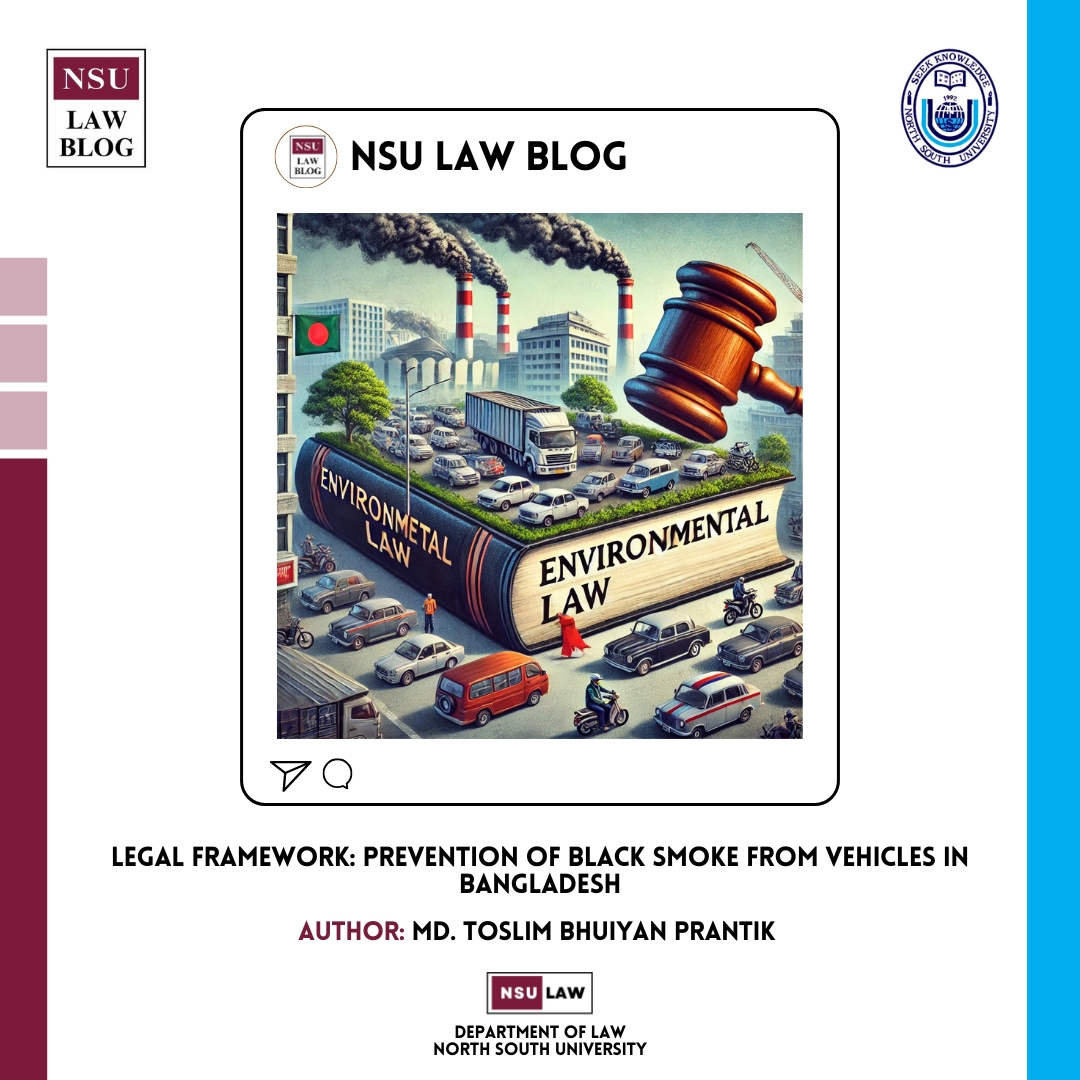Legal Framework: Prevention of Black Smoke from Vehicles in Bangladesh

The concerning impact of vehicle exhaust emissions on worsening air pollution is a critical environmental issue in Bangladesh that demands more attention. Among the different types of emissions, black smoke emitted from diesel vehicles causes air pollution, thereby significantly contributing to various health risks. This piece will try to provide an overview of Bangladesh’s legal framework regarding the prohibition of black smoke from vehicles and will try to address how effectively these laws deal with this pressing issue.
Bangladesh’s main legislative instrument for addressing air pollution is the Environmental Conservation Act of 1995. The Ministry of Environment, Forests, and Climate Change holds authority over this law and assigns responsibility for regulating vehicle emissions to the Department of Environment. The Act explicitly outlines regulations for black smoke emissions from diesel engines, with penalties imposed on vehicles failing to comply. Additionally, the Bangladesh Road Transport Authority (BRTA) has implemented inspection requirements for motor vehicles, which include testing for black smoke emissions.
In Bangladesh, enforcing these laws has been challenging despite their strong presence. The responsible regulating authority, BRTA, has been unable to adequately oversee and implement the regulations. Corruption, a shortage of skilled workers, and inadequate inspection facilities have made it challenging to carry out the rules as intended. As a result, many vehicles continue to spew black smoke, violating the regulations, and the health dangers involved due to such action are still quite discernible.
It is crucial to remember that air pollution is both a cause of death and a hallmark of Bangladesh’s general health problem. By looking at first-world nations like the USA, a recent study found that over 50,000 premature deaths are caused by air pollution each year. In addition to heart disease and cancer, respiratory issues are among the health hazards of air pollution. The financial burden of these health problems is also substantial; estimates place Bangladesh’s yearly air pollution expenses at 1% to up to 4% of GDP.
In the case of Bangladesh Environmental Lawyers Association (BELA) vs. Government of Bangladesh 61 DLR (A.D.) 53 (2009), the court affirmed the Government’s obligation to guarantee a hygienic and healthful environment for its populace. Keeping cars from emitting black smoke is in line with this responsibility and is crucial to protecting public health.
The issue of black smoke emissions from vehicles has been addressed throughout different courts across the world. For example, In the United Kingdom, through the case of R v. Smith [2000] UKHL 15, the Honourable Court stressed the significance of strictly enforcing car emission rules to safeguard the environment and public health. Therefore, we need to act quickly to reduce the amount of black smoke that cars emit.
There have been effective measures to control vehicle emissions and lower air pollution in other nations. For instance, the Clean Air Act was passed in the U.S. to control pollutants from motor vehicles. This statute created car emissions regulations and imposed fines for noncompliance. Manufacturers were given incentives to build cleaner vehicles in addition to these regulations.
The United States (U.S.) also established the Environmental Protection Agency (EPA) to guide and enforce the regulations. The EPA established vehicle testing procedures, and manufacturers had to meet these standards before selling their vehicles. These regulations resulted in a significant reduction in air pollution and improved public health. In the United States, from the case of Massachusetts v. Environmental Protection Agency, 549 U.S. 497 (2007), the Honourable Court addressed the fact that the Environmental Protection Agency is instructed by the Clean Air Act to control emissions of air pollutants that jeopardize public health or welfare, as was indicated in the 2007 case of Massachusetts v. EPA. Undoubtedly, this includes vehicle emissions of black smoke, which calls for efficient emission reduction strategies.
Many South Asian nations suffer from high levels of vehicle emissions that exacerbate air pollution. Among them, Bangladesh and India are often cited as having significant issues with vehicle emissions, namely with black smoke and in the landmark decision of MC Mehta v. Union of India, AIR 1997 SC 734, the Indian Supreme Court held that the right to a clean environment is guaranteed by Article 21 of the Indian Constitution and is a fundamental right. Therefore, the Government must take aggressive measures to safeguard this fundamental right, such as banning the emissions of black smoke from vehicles.
It is necessary to fortify Bangladesh’s car emissions regulations and allocate sufficient funding for their implementation. This can entail setting up a separate regulatory agency with the tools and knowledge required to keep an eye on and implement the rules. Incentives might also be offered to promote the purchase of greener cars, and public awareness and education initiatives might receive more attention.
In 2018, the Government of Bangladesh was directed by the Honorable High Court Division to implement efficient measures aimed at reducing the amount of black smoke emanating from vehicles in the nation. The court ordered the government to act to lower emissions after noting that vehicle-related air pollution posed a serious threat to public health. The Bangladeshi government implemented the Bangladesh Vehicle Emission Standard (BVES) as one of the steps to lower the amount of black smoke emissions from vehicles. For both new and used cars, the BVES establishes emission standards and mandates routine inspections to guarantee compliance. The government also implemented a car scrappage program to get outdated and environmentally harmful vehicles off the road.
Prevention of black smoke emissions from vehicles remains a critical challenge within Bangladesh’s legal framework. Regulations to lower car emissions exist, but enforcement has proven to be much more difficult. There is a need to take action to combat air pollution because of the severe health hazards and accompanying financial expenses. Bangladesh can improve public health and drastically cut vehicle emissions by fortifying its regulatory framework, funding enforcement efforts, and creating incentives for cleaner vehicles.

Md. Toslim Bhuiyan Prantik1 Posts
Md. Toslim Bhuiyan Prantik is an LL.M. student at North South University and currently serves as a Research Assistant at the same institution. He is deeply passionate about exploring the intersections of law, literature, and social change. His legal research and writing focus on critical societal issues, including human rights law, violence, and atrocity prevention. In addition to publishing opinion pieces on pressing social matters, he serves as an Associate Editor for the NSU Law Blog and previously worked as a Teaching Assistant (TA) in the Department of Law at North South University.


1 Comment
Protik Sen
March 18, 2024 at 6:31 AMExcellent work. Wish you all the Best Vaiya.🌷❤️